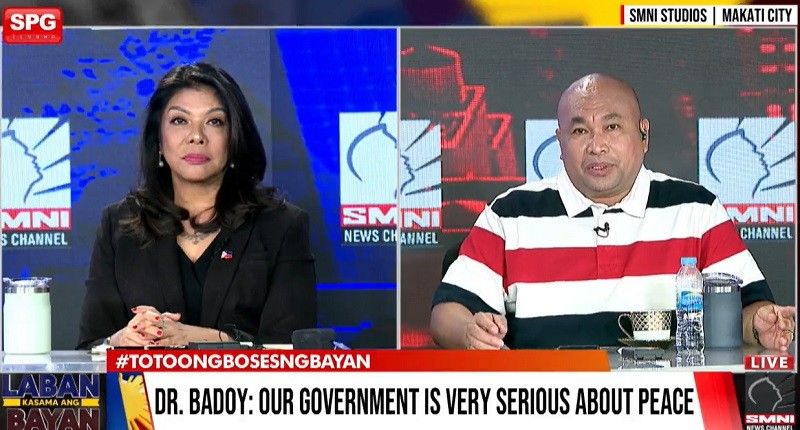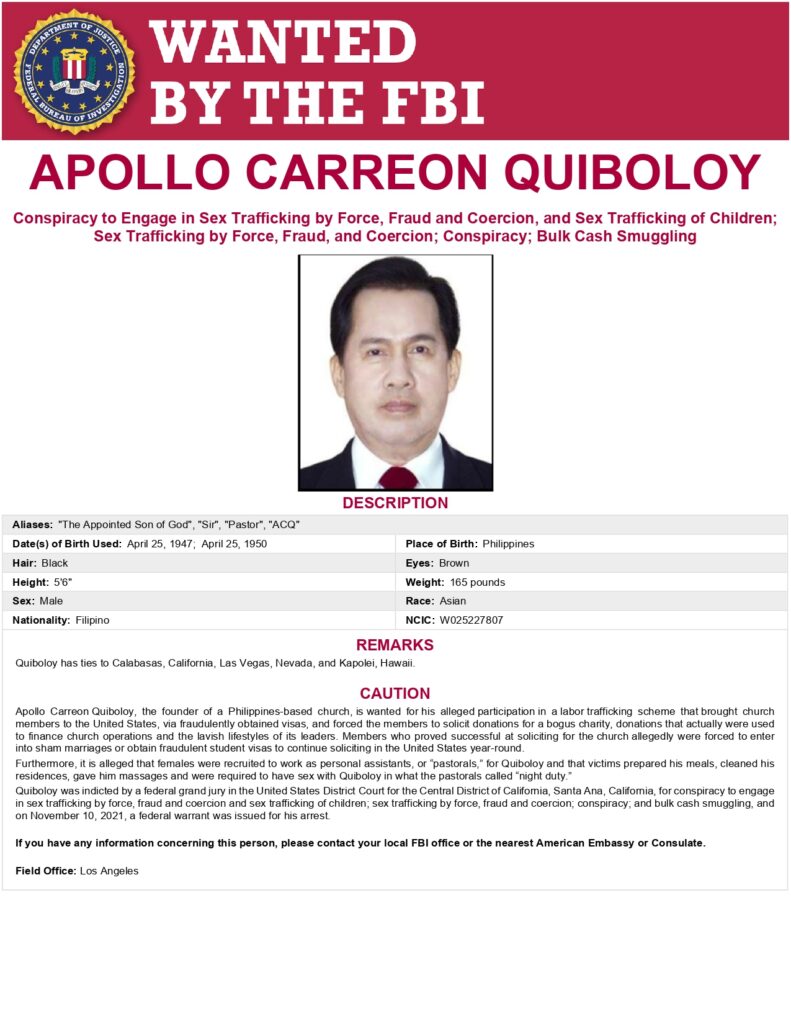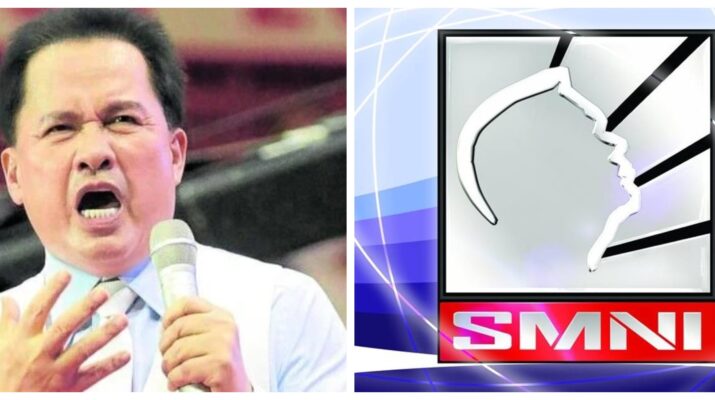Two bills filed in the House of Representatives this month will prove to be problematic for the Sonshine Media Network International (SMNI), the broadcasting company of cult leader Apollo Quiboloy.
First, a resolution filed by Rep. Margarita Nograles which asks the National Telecommunications Commission (NTC) to suspend the broadcaster’s operations – was adopted by the House last week. Separately, a bill filed by Rep. Ramon Gutierrez also seeks to repeal the broadcasting franchise given to SMNI in 2019.
Either motion will be enough to take SMNI off the air, having to deal with both at the same time will make life even harder for the broadcasting arm of Quiboloy’s Kingdom of Jesus Christ – a highly political religious cult which is closely aligned to former President Rodrigo Duterte.

SMNI’s predicament is reminiscent of broadcasting giant ABS-CBN’s fate, which – as a result of a much-publicized vilification campaign by then President Duterte – had its operations shut down in 2020.
ABS-CBN’s closure garnered heavy criticism in both the Philippines and abroad, being seen as an attack on the freedom of the press and seeing Duterte’s efforts to shut it down as his personal vendetta against the broadcaster for allegedly not supporting his presidential campaign in 2016.
There is much less pushback with the closure of SMNI’s operations, however. Contrary to being seen as a suppression of the free press, closing down the broadcaster will actually be seen as a move to restore authenticity and reliability in the Philippine political discourse.
The moves to close down SMNI’s operations did not happen in a vacuum. For years, the religious network has been a purveyor of disinformation and has platformed red-taggers in its programs – becoming a mouthpiece of the National Task Force to End the Local Communist Armed Conflict (NTF-ELCAC).
The motion asking the NTC to stop SMNI’s operations and the bill filed to revoke its franchise stem from a claim made by one of the network’s hosts – Jeffrey Celiz – alleging that House Speaker Martin Romualdez’s travel expenses hit Php1.8 billion; a claim which Celiz has since apologised for and retracted.
Both Rep. Nograles’ motion to the NTC and Rep. Gutierrez’s bill point to SMNI violating the terms of its franchise including the “dissemination of deliberately false information or willful misrepresentation to the detriment of public interest.”

Keen observers of Philippine politics are cognizant of Celiz’s motivations for making such accusations, and why SMNI allowed the claim to be aired. Speaker Romualdez has earned the ire of former President Duterte and his faction, and with the broadcast network being closely aligned with the latter it suits them to malign the House Speaker in that way.
Quiboloy, the cult’s leader, was designated as former President Duterte’s “spiritual advisor” and was a staunch ally of the latter’s administration. When Duterte ally, Gloria Macapagal-Arroyo, was demoted from her deputy speaker position in May, the move was seen to have antagonised the Duterte faction – including Quiboloy and his SMNI network.
Since then, animosity began forming between forces loyal to Duterte and House Speaker Romualdez, who is incumbent President Bongbong Marcos’ cousin and a close ally of the current administration.
However, SMNI’s disinformation streak not only targets allies of the Marcos administration. Well before the bad blood between Romualdez and the Duterte faction commenced, Quiboloy’s network had long been spreading disinformation against left-leaning political parties, human rights groups, and other leftist personalities.
Two of the network’s most prominent program hosts, Jeffrey Celiz and Lorraine Badoy, are serial red-taggers who were once affiliated with the NTF-ELCAC – a brainchild of former President Duterte’s.
The two have accused indigenous rights activists, journalists and even LGBTQI+ groups of involvement in the communist rebellion. This act of red-tagging often leads to the wrongful arrest and even the killing of the red-tagged individuals.

Even with cases of red-tagging alone, lawmakers have enough evidence to revoke SMNI’s operations for deliberate disinformation. By antagonizing the ruling party of President Marcos, the broadcast network might have accelerated efforts to do just that.
While disseminating fake news is enough to merit the shut down a broadcaster, SMNI have a myriad of other infractions that have provided further ammunition for its opponents to take it off the air.
The Kapisanan ng mga Broadcaster ng Pilipinas (KBP), the country’s independent broadcasting body, have flagged SMNI for allowing Celiz and Badoy to go on air as political journalists despite not being accredited with their body. Accredited journalists undergo training on the KBP’s code of ethics, an orientation which neither of the two shock jocks went through.
Apollo Quiboloy, who registred SMNI as a corporation in 2006, also transferred the controlling stake of the company to another church member, a certain Marlon Acobo this year. Under the terms of the network’s franchise, it must inform Congress of any changes to its ownership or controlling interest – which Quiboloy failed to do.
Disregarding the multiple infractions made by SMNI as a corporate entity, there are ample grounds to cease its operations purely because of the character of its founder and leader, Quiboloy. The self-proclaimed “Appointed Son of God” was indicted by a U.S. federal court on charges of human and child sex trafficking in 2021.

A wanted poster on the U.S. Federal Bureau of Investigation (FBI) website states that Quiboloy “is wanted for his alleged participation in a labor trafficking scheme that brought church members to the United States, via fraudulently obtained visas, and forced the members to solicit donations for a bogus charity, donations that actually were used to finance church operations and the lavish lifestyles of its leaders.”
Furthermore, it is alleged that females were recruited to work as personal assistants, or “pastorals,” for Quiboloy and that victims prepared his meals, cleaned his residences, gave him massages and were required to have sex with Quiboloy in what the pastorals called “night duty.”
It’s beyond deplorable that an indicted child sex trafficker is a leader of a so-called religious movement, but this character is also not befitting one who should be running a news network – a broadcaster that promulgates political advice to the public.
Thus, the shut down of SMNI is not regrettable and in fact, is the right move that Congress should make. The faux news network is a purveyor of disinformation, endangers the lives of activists with its reckless red-tagging, and is helmed by a man who is wanted by foreign authorities for serious crimes.
Its disappearance from the Philippine political discourse should be welcome news to all.

